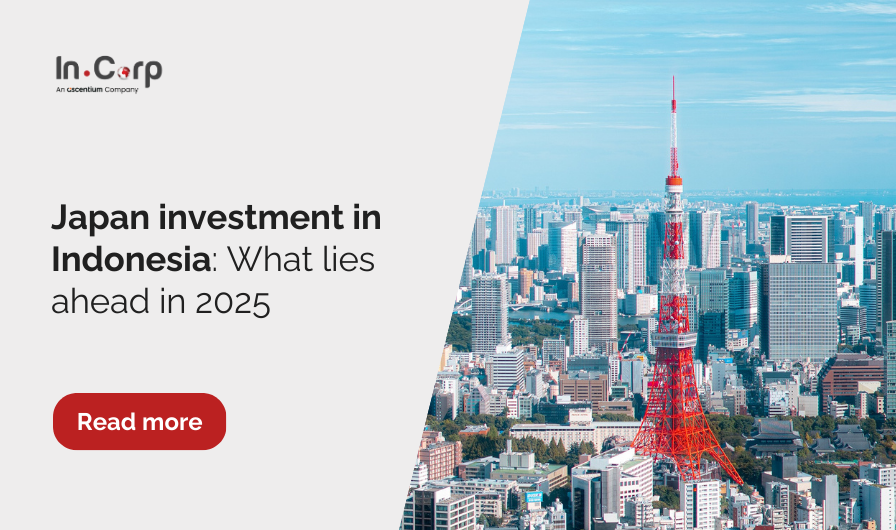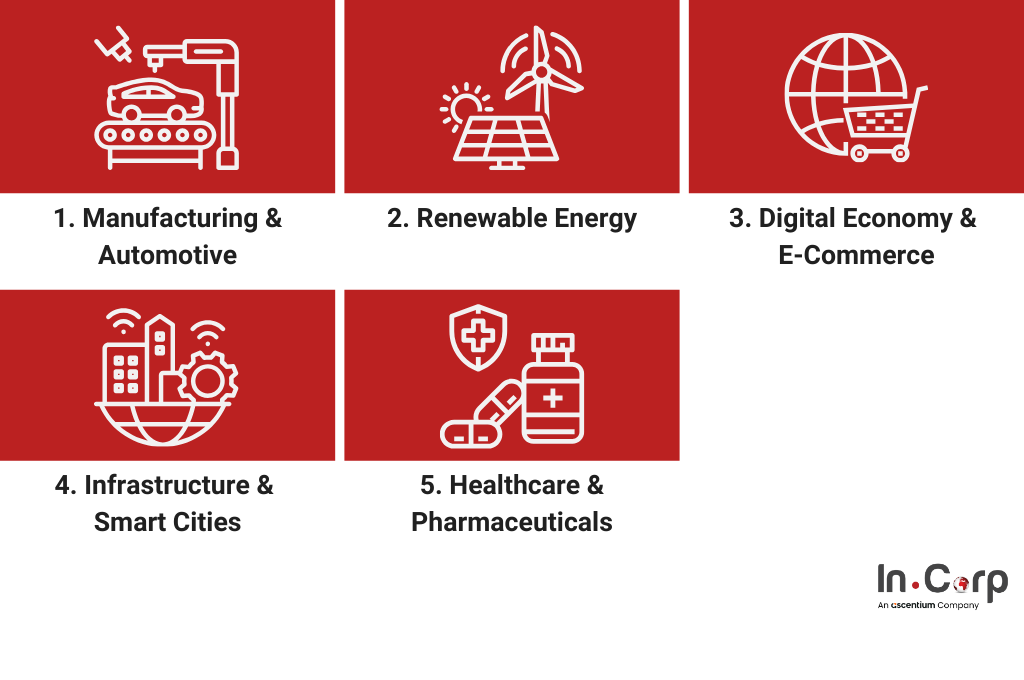Japan investment in Indonesia continues to play a vital role in shaping the country’s economic growth. With Indonesia’s rapidly developing economy, Japanese investors are finding more opportunities to expand and thrive across various industries.
This guide highlights why Indonesia is an ideal destination and how Japanese businesses can leverage its potential.
Japan investment in Indonesia: Current outlook
Japan investment in Indonesia remains strong, consistently ranking among the leading sources of foreign direct investment (FDI). In 2023, Japan became Indonesia’s fourth-largest investor, contributing USD 4.63 billion to sectors such as automotive manufacturing, infrastructure, energy, and digital technology.
Globally, Japan’s investment outflow reached USD 60 million, making it the world’s second-largest FDI source. This strengthens Indonesia’s position as an investment hub, with economic ties between the two countries expected to grow further in 2025.
Read more: A Closer Look at Indonesia-Japan Relations
Why Japan investment in Indonesia continues to grow
The future of Japan investment in Indonesia looks promising. As Indonesia develops its infrastructure, technology, and industrial sectors, Japanese businesses stand to benefit from several key advantages:
Strong economic growth
Indonesia’s rapidly expanding economy presents significant stability and growth prospects. The country’s increasing Gross Domestic Product (GDP) and rising consumer spending make it a lucrative market for investment and business development.
Large consumer base
With 270 million people, Indonesia provides a huge Japanese product and service market. The growing middle class is increasing demand for automobiles, electronics, and consumer goods.
Pro-investment policies
The government implements tax incentives and streamlined regulations to encourage foreign investments. These measures facilitate the growth and expansion of Japanese businesses, allowing them to navigate the market more effectively.
Growing infrastructure & digital economy
Indonesia is developing its roads, ports, and smart cities, which creates new investment opportunities. Additionally, the digital economy is expanding, aligning with Japan’s expertise in technology and innovation.
Strong Japan-Indonesia ties
Both countries have good trade agreements and help from their governments. This makes it safer to invest money and creates a steady place for businesses to grow.
Read more: The economic impact of foreign investment in Indonesia.
Top 5 sectors to invest in 2025
For Japanese investors looking to expand their businesses to Indonesia, these are the five key sectors that stand out as the most promising industries in 2025:
1. Manufacturing & automotive
Indonesia is a significant hub for car and electronics production, especially with the rise of electric vehicles (EVs). Japanese companies can expand their presence in this booming sector.
2. Renewable energy
The government invests in clean energy sources like solar, wind, and geothermal. Japanese firms with expertise in green technology have a substantial opportunity here.
3. Digital economy & e-commerce
With more internet users and mobile transactions, e-commerce, fintech, and digital services are thriving. Japan’s tech companies can benefit from Indonesia’s digital boom.
4. Infrastructure & smart cities
Massive transportation, real estate, and urban development projects are transforming Indonesia. Japanese businesses can contribute to smart cities, construction, and public transport.
5. Healthcare & pharmaceuticals
Demand for better healthcare and medical innovation is rising, offering potential for Japanese companies with expertise in pharmaceuticals and medical technology.
Read more: Exploring investment potential in Indonesia.
Investment challenges in Indonesia
While Japan investment in Indonesia offers many advantages, investors must also understand the challenges to succeed:
Complex regulations
Indonesia has strict regulations, especially regarding business licensing and foreign ownership. Investors must stay updated on legal and compliance requirements.
Infrastructure & logistic issues
Despite improvements, transportation and supply chain inefficiencies remain a challenge. Due to logistics delays, investors in manufacturing and exports may face higher costs.
Changing tax & investment policies
Frequent updates to tax and investment rules can affect business operations. Businesses must stay informed to avoid unexpected legal issues and penalties.
Cultural & business practices
Local business culture and negotiation styles differ from those in Japan. Building strong local partnerships can help foreign investors navigate the market more effectively.
How can InCorp help Japanese businesses in Indonesia?
Indonesia is a top choice for Japanese investors, providing strong business growth and expansion potential. While challenges exist, the proper planning and support can help businesses succeed.
To ensure a smooth investment journey, InCorp Indonesia (An Ascentium Company) offers expert guidance and local support, instilling confidence in Japanese businesses looking to thrive in Indonesia’s market. Our comprehensive services include:
- Company Registration: Get your business legally registered and compliant with Indonesian regulations.
- Investor KITAS Assistance: Secure the proper visa to stay and operate your business in Indonesia.
- Business Licensing: Obtain the necessary permits and licenses to run your business in Indonesia legally.
Contact us today to start your business expansion in Indonesia with our professional assistance. Let us help you navigate the opportunities and challenges of the Indonesian market and make your investment successful.
Get in touch with us.
What you'll get
A prompt response to your inquiry
Knowledge for doing business from local experts
Ongoing support for your business
Disclaimer
The information is provided by PT. Cekindo Business International (“InCorp Indonesia/ we”) for general purpose only and we make no representations or warranties of any kind.
We do not act as an authorized government or non-government provider for official documents and services, which is issued by the Government of the Republic of Indonesia or its appointed officials. We do not promote any official government document or services of the Government of the Republic of Indonesia, including but not limited to, business identifiers, health and welfare assistance programs and benefits, unclaimed tax rebate, electronic travel visa and authorization, passports in this website.




